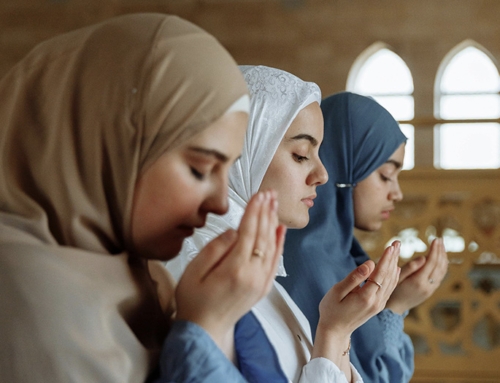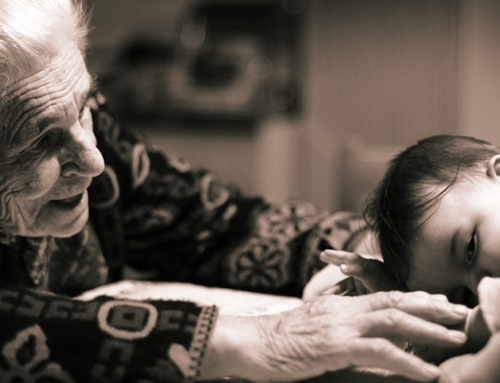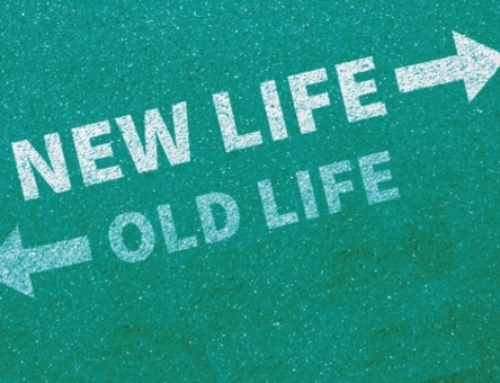By Laura El Alam
For those of us who are converts to Islam, the death of a non-Muslim loved one can be a multi-layered trauma. We experience the typical grief of losing someone who is dear to us, but we also grapple with additional emotions, worries, and questions. In my own experience, the deaths of my father and grandfather brought on a variety of difficult feelings, and at the time, no one in my life truly understood what I was going through. I think only a fellow convert can understand the pain that is felt when a beloved non-Muslim relative or close friend dies.
Will they go to Paradise?
The first question many of us have is whether our loved one has any chance of entering into Jannah if he or she was not a Muslim. When we care about someone deeply and consider all the good things they have done, it is extremely painful to imagine them suffering the torments of hell. To compound our fears, some Muslims assure us that all disbelievers will certainly be doomed. This happened to me, and it was one of my first philosophical dilemmas as a new Muslim.
About three days after taking my shahada, I visited some Muslim neighbors. The family warmly welcomed me into their home and celebrated my decision to embrace Islam. Everything was going well, but then somehow the topic of my grandfather, who had recently died, came up in the conversation.
“Oh, too bad he will go to the Hellfire,” said the eight-year-old son nonchalantly.
I instantly felt a stab of pain, thinking of my beloved grandfather suffering such a horrible fate. I looked to the boy’s mother, expecting her to refute this harsh statement, but she shook her head sadly and agreed with her son. “I’m sorry, but it is clear that disbelievers cannot enter Jannah,” she told me.
“Even if they never learned about the deen?” I asked. “My grandfather didn’t know anything about Islam. And I never had the chance to teach him about it.”
“The fitra was given to all human beings, and it’s the responsibility of each individual to seek the Truth,” she said. “So there is no excuse for anyone. No disbeliever will be admitted into Paradise.”
Since that day, I have heard many Muslims express the same sentiment. I realize now that they are not trying to lie to me or upset me; they believe it is the truth. What I have learned over the years is that even people who have been Muslims their whole life – and even people who seem very confident in their responses and solid in their knowledge – are not always correct. It is always best to seek a scholarly opinion on topics of great import. The average Muslim inevitably has misconceptions and false information that they believe to be true.
This conversation about my grandfather broke my heart and made a lasting, negative impression on me. On one hand, it made his death even more painful. On the other hand, it confused me about my newfound faith. Why would a good, kind man automatically be thrown into the Hellfire? My grandfather had grown up on a farm in the Midwest in the early 1900s, and I can say with near certainty that he never had any meaningful exposure to Islam. How could Allah punish him–or anyone –whose life circumstances did not even introduce them to the Straight Path?
Who has the right to judge?
I have since learned that my neighbors’ comments about my grandfather were inappropriate and incorrect. No one has the right to speculate on any human’s destination in the Hereafter unless Allah has specifically told us his or her fate in the Quran, or through revelation to the Prophet Muhammad (peace and blessings be upon him).
“Only Allah decides on individuals’ heaven and hell,” explains Sheikh Yasir Qadhi in a lecture. “No one has the right to say if someone, whether Muslim or non-Muslim, is going to heaven or hell.”1 “We should not state an individual is going to heaven or hell unless Allah has told us.”2
We know, for instance, that Abu Lahab was condemned to the Hellfire because it says so in the Quran. But without Allah’s explicit revelation, we cannot and should not comment on other people’s final destination. There is no guarantee that every Muslim will go to Jannah, nor any guarantee that a non-Muslim will be denied entry there.
While Islam is the correct path to Jannah, Allah can grant His mercy to any individual, based on circumstances and criteria that He alone knows. “… a person whose legal identity is Christian is classified as an unbeliever in Islamic law; they are not buried in a Muslim cemetery, etc. But they might be a true monotheist and moral exemplar who just never heard the message of Islam and someone who God will reward with a place in the Garden,” writes Dr. Jonathan Brown for Yaqeen Institute.3
Can we pray for them?
While our non-Muslim loved ones are alive, we can and should make duaa (supplication) for them. We can ask Allah to bless, guide, forgive, and protect them. However, once they have died, we are not supposed to ask for their forgiveness, according to Sheikh Yasir Qadhi.4 He explains that Allah specifically forbids making duaa for the disbeliever once they have died, even if they are close family members. But this does not mean they are necessarily going to hell, Qadhi clarifies; only Allah knows their fate.
Sheikh Qadhi says that while we should not request their forgiveness with our tongues, we may hope in our hearts that Allah will grant them Jannah, and we may find immense comfort in the fact that He is the ar Rahman, the Most Merciful and al Ghafur, the Ever-Forgiving and All-Forgiving. After all, His mercy is not limited to Muslims; it is for His whole creation.
In the Quran, Prophet Ibrahim (peace be upon him) says:
My Lord! They have caused many people to go astray. So whoever follows me is with me, and whoever disobeys me—then surely You are still All-Forgiving, Most Merciful. (14:36)
Notice that while Prophet Ibrahim (peace be upon him) does not ask directly for Allah’s absolution for the disbelievers, he does express his complete trust in Allah’s forgiveness and mercy.
We can also take solace in the fact that Allah is al Hakam, the Giver of Justice, al ‘Aleem, the All Knowing, al Baseer, the All Seeing, and al Hakeem, the Most Wise. Therefore He will not make a mistake in evaluating or sentencing any human being. A human judge might issue an unfair verdict if he or she is biased, merciless, unaware of extenuating circumstances, or ignorant of some details. But Allah is the Perfect Judge – One who will not make mistakes because He knows every single detail, every intention, every hidden thought, every circumstance, and every piece of the puzzle. Unlike a human magistrate who might mistakenly condemn an innocent person, or exonerate a guilty one, Allah will not make a single error in His decisions. We can trust that He knows the complete truth and will decide on the perfectly fair and appropriate consequence for each and every human, whether Muslim or non-Muslim.
What if I failed as a role model?
Added to converts’ grief is often the worry that we did not do enough to teach our non-Muslim loved ones about Islam while they were alive. In fact, sometimes our brothers and sisters in faith will add to our guilt by asking us, “Didn’t you give dawah to him?” or “If they spent so many years with you, why didn’t their heart soften to Islam?”
While we definitely should strive to give a positive example of Islam to non-Muslim family and friends and to be excellent ambassadors of our faith, a person’s guidance, ultimately, is not in our hands. Only Allah is al Hadi, the Guide. In the Quran, He says:
You surely cannot guide whoever you like, O Prophet, but it is Allah Who guides whoever He wills, and He knows best who are fit to be guided. (28:56)
Even the Prophet Muhammad (peace and blessings be upon him), the most perfect human and ultimate role model, was unable to convince his beloved uncle, Abu Talib, to embrace Islam. Why, then, should we blame ourselves if our best efforts to teach our loved ones about Islam did not have the apparent result we desired? I say “apparent” because who but Allah knows what lies in a person’s heart as they take their final breath? It is possible that the truth of Islam has been clear to them all along, but just not spoken aloud. We can always hope that the seed of faith we planted in their hearts will bloom at just the right moment.
May I attend their funeral or memorial service?
Another conundrum might arise upon the death of a non-Muslim relative: is it Islamically permissible to attend their funeral or memorial service, particularly if it is held in a church, synagogue, or other place of worship?
Some scholars say that it is impermissible to attend the funeral service of a non-Muslim. In fact, when I first started researching this topic online, that was the only opinion I found. However, there is a more nuanced response. Sheikh Yaser Birjas, currently the Head of the Islamic Law and Theory Department at the Al-Maghrib Institute and the Imam at Valley Ranch Islamic Center in Irving, Texas says, “It is permissible for a Muslim to attend the funeral of a non-Muslim, show support, and offer condolences. But the Muslim should avoid participating in any ceremony that involves statements or practices that contradict the sharia.”
“A Muslim is permitted to attend the funeral prayer as a show of courtesy with non-Muslims,” agrees Sheikh Faysal Mawlawi, Deputy Chairman of the European Council for Fatwa and Research.5 “On certain occasions, attending funerals serves as a means of showing peaceful coexistence with non-Muslims, which is recommended. However, a Muslim is required to be cautious when attending such funerals and he is not allowed to reiterate the phrases uttered by non-Muslims in the funeral procession, at their cemeteries, or even in the way he offers his condolences.”
“There is no legal impediment to hold you back from attending your non-Muslim friends’ and relatives’ funerals,” states Egypt’s Dar Al-Ifta.6 “Imam al Nawawi said in his book (al Majmu’) ‘it is not a disfavored act for a Muslim to attend the funeral of a non Muslim relative,’ and this was also stated by Imam al Shafi’i.”
“Also,” continues Dar Al-Ifta, “attending the funeral of a relative even if he is a non Muslim strengthens the ties of kinship which is commanded by Islamic Shari’ah. It is also important to attend the relatives’ funerals as a token of refined manners, good relationship with others, loyalty and love. Similarly attending the funeral of your relative would increase respect and admiration for Islam in your family and would give a positive impression that Islam promotes coexistence and harmony.”7
Our greatest consolation
When we lose a loved one, sadness is inevitable. Pain is an inevitable part of this dunya, and Allah has told us that He will test us with loss:
And We will surely test you with something of fear and hunger and a loss of wealth and lives and fruits, but give good tidings to the patient, who, when disaster strikes them, say, “Indeed we belong to Allah, and indeed to Him we will return.” (Quran 2:155-156)
Even in our grief, we can take comfort in Allah’s vast, incomparable, limitless mercy and forgiveness. We can pray that He will accept and reward all the efforts we made to nurture ties of kinship with our non-Muslim loved ones while they were alive, as well as our attempts to teach them about Islam through our words and deeds. In the face of loss, we can strive to be among the patient and steadfast believers. We know that ultimately, His plan is perfect, whether we perceive it or not. He will undoubtedly deal fairly, wisely, and mercifully with our non-Muslim loved ones, and this should be our greatest consolation.
[1] https://www.youtube.com/watch?v=SGp8agPAuxI
[2] https://www.youtube.com/watch?v=1XA4qUykJ2c
[4] https://www.youtube.com/watch?v=1XA4qUykJ2c
[5] https://fiqh.islamonline.net/en/attending-the-funerals-of-non-muslims/
[6] https://www.dar-alifta.org/en/fatwa/details/5935/a-muslim-attending-the-funeral-of-a-non-muslim
[7] Ibid.
Got Questions?
We have Answers. Get in touch now.








